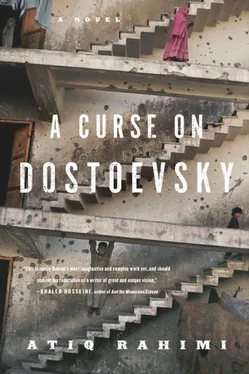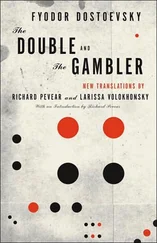He still doesn’t dare shoot.
No, I don’t want this man to die a martyr.
He throws down the pistol.
And leaves.
GET LOST! There’s nothing here anymore,” grumbles a cavernous voice. But Rassoul keeps banging on the door of the saqi-khana , and in the end it fearfully cracks open. “Is that you, Rassoul? You should have said!” exclaims Hakim. “Which Rassoul is it, the holy man or the pothead?” asks Kaka Sarwar as usual, his voice seeping out along with the smell and the smoke.
Rassoul enters and finds a place among the circle of men; the same men, all keeping a solemn silence as they stare at Kaka Sarwar, who is smoking greedily. Rassoul looks around for Jalal. He is no longer there to ask if the war has started yet. It’s Mustapha who asks, breaking the languor of the circle. Others shush him. Silence again, still solemn, still focused on Kaka Sarwar. Everyone is waiting for him to pass on the pipe and continue the tale that Rassoul’s arrival has interrupted.
“Should I start again at the beginning?”
“No, just keep going!” cries everyone at once.
“But this young man wasn’t here!”
“We’ll tell him the beginning later.”
“OK,” he says, and passes the chillum. “Where was I? I’ve lost my thread…”
“You found yourself in a village…”
“That’s right. And what a village! Houses carved out of wood, with no windowpanes, no doors, and no courtyard walls. I could hear voices, but couldn’t see anyone. The houses were empty. Or rather the darkness prevented me from seeing anyone or anything. There were only voices, nothing but voices, orchestral, harmonious, peaceful voices. They were coming from a semi-ruined cave on the edge of the village, at the foot of a rocky, steep, arid hill. All the villagers were there, dancing in a trance. Men and women. Young, old, children. The men wore vine leaves on their heads; the women’s shushuts were embroidered with cowries and red pearls. They were handing out drinks to everyone.”
“Were they unbelievers?”
“I’ve no idea. They were all drinking and singing. My presence didn’t disturb them at all; it was as if I didn’t exist. They even served me drinks, without a single question; first a vibrant yellow liquid called ‘stone saw’; then a bright red one called ‘stone file.’ The first was sour; the second bitter.” Kaka Sarwar pauses again to smoke. “I drank a lot that night! And nobody seemed to want to know why I was there. Once I had identified their leader, who was a woman, I went to see her. I had barely said hello when she greeted me and asked: ‘Are you lost, young man?’ I shyly admitted that I was. With a friendly smile, she welcomed me to the ‘Valley of Lost Words.’ She asked me where I was going, and where I had come from. Once I had told her everything she nodded, offered me a final glass of ‘stone file’ and called over an old man to take me to the neighboring village. He gave me a storm lamp, and off we went. He walked confidently and fast. I rushed to light the path in front of him, but he told me to keep the lamp for myself as he didn’t need it. Panting, I asked him how it was that they had a woman as leader. As we walked, he told me an incredible story that I will tell you all tomorrow.”
“No, now! Come on!” they all protested. Kaka Sarwar turned toward Hakim: “But I’m hungry.”
“We’ll buy you a kebab and some tea. Who has money?”
Nobody moved except Rassoul, who took a high-value note out of his pocket and gave it to Hakim.
“You will never be bankrupt!” Kaka Sarwar blessed him. “So I will tell the rest of the story to you. But first, the chillum!” They gave it to him; he smoked and passed it to Rassoul. “This woman, the head of the village, was the descendant of a great sage among sages, who lived a long time ago in a faraway kingdom. He was blind, but able to read manuscripts simply by caressing the letters with the tip of his finger. Misfortune hit him one day when people noticed that, as he read, the words were slowly being erased from the book.” He stops and stares at the enthralled faces around him. After a deep breath, he takes the chillum once more. The smoke muffles his voice: “Poets, holy men, judges… all were panicking. They hid their manuscripts for fear that they would be read by this blind sage. And they forced the king to banish him from the kingdom. The sage and his whole family went into exile against their will. He settled in the valley I was telling you about. He built a city where everyone learned everything by heart. They didn’t have a single book, nothing was written down. Because they knew it all. Books are made for idiots!” He bursts out laughing, then smokes, coughs, and continues: “They invented a new language, one impossible to forget. From then on storytellers, poets, and holy men flocked to this valley from all over the world so that the people would translate their work, bring it to life in their voices, and immortalize it in their memories. It is said that in this place even stories that had been forgotten—true and false, known and unknown—came back to people’s minds, took shape once more, reconnected to the voices of the storytellers… And this was, of course, threatening to the history distorters, the tale forgers, the falsifiers of secrets, the science imposters, the shady politicians… One day, they all descended upon the village. Invaded and destroyed it. They destroyed everything! They deafened the children and cut out the adults’ tongues. But…” a pause, a long drag on the chillum, “but what they didn’t realize was that in this valley there were not only human beings. The houses, the trees, the rocks, the water, the wind, the air, the birds, the snakes… everything in this valley could remember the people, its history, its wisdom, and also the barbarism of the tyrants!” His voice gathers pace, trembles. “Yes, everything can be destroyed, but never memory, or memories. Never!” He falls silent and withdraws from the circle to lean against the wall.
“What happened then?” asks Mustapha, seemingly bewitched.
“What do you mean, then?”
“To you?”
“To me? Oh, yes!” exclaims Kaka Sarwar, moving away from the wall. Serene once more, he continues: “My guide finished the story about his leader just as we entered the neighboring village. He left me at a hidden shrine where I could spend the night. As I gave him back his storm lamp, as I shook his hand and thanked him, I noticed that he was blind!”
“You’re kidding!” cries Mustapha, astounded. Another young man objects: “Kaka Sarwar, you invented this story. It never happened. It isn’t true!”
“But now it is—as a holy man among holy men from the land of the setting sun used to say— because I have told it to you,” retorts Kaka Sarwar with a mischievous smile.
“Where do you get all these stories, Kaka Sarwar?”
“From the Valley of Lost Words, my son.”
“So it really does exist, then!” exclaims Mustapha.
Another few drags: the dry tongue, the hacking cough setting fire to the chest, the blood freezing in the veins, the heart beating slowly, and the whole body flying.
* * *
At that point Rassoul stands up, steadies himself against the wall and leaves the smoking den.
Outside, the city is a furnace. Everything is rippling in the heat: the mountain, the houses, the stones, the trees, the sun… Everything is quaking with fear. Except Rassoul. He is light, soothed. He walks the streets like the last man on earth, unable to catch a single eye, caress a single soul, or hear a single word. He feels like crying out that he is the last man, that the others are all dead, dead to him; and then to start running, and laughing… all the way to the Larzanak bridge.
Читать дальше












